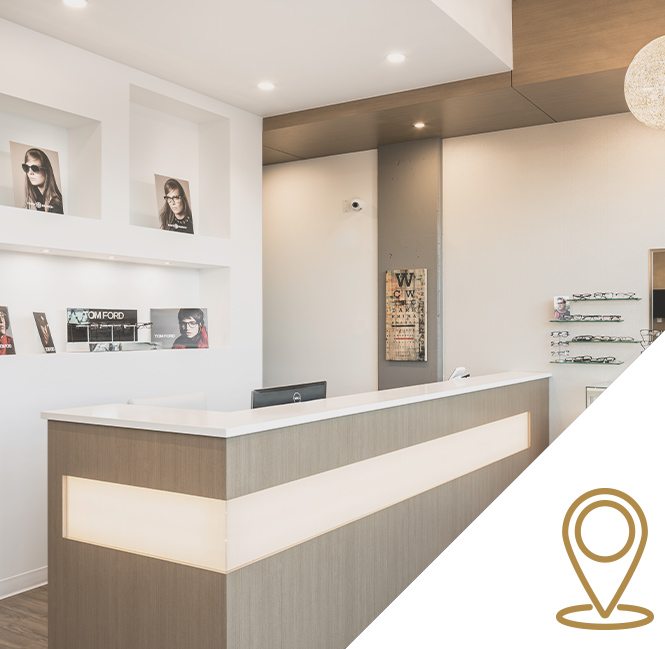Finding the right pair of contact lenses for your vision and eye care needs can be a struggle. This is especially true for individuals who may not be a good candidate for standard, or corneal, contact lenses.
Certain eye conditions like dry eye or corneal irregularities can limit your ability to wear contact lenses, however, individuals with these conditions may benefit from scleral lenses. Scleral lenses provide the vision correction of a contact lens while being able to accommodate significant corneal irregularities, including conditions like keratoconus. They can also be a good option for individuals with severe dry eyes or post-surgical complications.
Scleral lenses are custom-fit to your unique eyes. To find out if you are a good candidate for scleral lenses, the first step is to contact your eye doctor to book a contact lens exam and fitting.
What Are Scleral Lenses?
Scleral lenses can provide vision correction for hard-to-fit eyes. While standard corneal contact lenses sit directly on your cornea, scleral lenses are wide-diameter lenses that are designed to vault over your cornea and rest on the sclera, the white part of your eye. This leaves a gap between the lens and your corneal surface.
Because of how scleral lenses fit, they can accommodate any degree of corneal irregularity. Scleral lenses can also provide a higher level of vision stability and comfort than corneal lenses, as they rest on the less sensitive conjunctival tissue of your scleral.
Scleral Lenses for Corneal Irregularities
One of the main advantages of scleral lenses is their ability to correct vision in people with irregular corneas.
This is especially important for people with keratoconus, a condition in which the cornea becomes thin and cone-shaped. Keratoconus is a progressive disease, and while it doesn’t cause blindness, it can cause blurred and distorted vision. In addition to scleral lenses, keratoconus may be treated with glasses, rigid permeable contact lenses, or a corneal transplant.
Scleral lenses can also be used to treat other corneal problems, such as severe astigmatism or irregularities caused by eye surgery.
Even minor corneal irregularities can make it difficult to wear corneal contact lenses. Some factors that may cause you to develop irregular corneas include:
- Birth defects
- Corneal injuries
- Severe dry eye
- Eye surgery
- Astigmatism
- Keratoconus
Scleral Lenses for Dry Eyes
Another benefit of scleral lenses is their ability to provide relief for individuals living with severely dry eyes.
When inserting scleral lenses, you will first need to fill them with a preservative-free saline solution. The saline should create a cushion of liquid between the lens are your cornea, which can act as a reservoir of moisture, keeping your eyes hydrated and reducing irritation. Scleral lenses can also protect your cornea from exposure to environmental irritants, such as dust and wind, which can exacerbate dry eye symptoms.
Scleral lenses are also made of gas-permeable material, which allows oxygen to pass through the lens to maintain corneal health.
Scleral Lens Fittings & Care Instructions
Scleral lenses can be a great option for individuals who have not found success with corneal contact lenses. While scleral lenses and corneal lenses do have their differences, they can be similar in how they need to be cared for and handled.
Wearing & Caring for Scleral Lenses
Proper care and wear are absolutely essential to maintaining healthy vision while wearing any type of lens, including scleral lenses.
Good lens care always includes:
- Washing your hands prior to handling your lenses
- Use a lint-free towel when drying your hands
- Use the cleaning solution recommended by your optometrist
- Never use tweezers with your lenses
- Insert your lenses prior to applying makeup
- Replace your lenses as suggested by your optometrist (scleral lenses typically last 1-3 years)
- Do not shower in your lenses, or expose them to any water source (including pools and lakes).
- Do not sleep in your lenses
Scleral lenses need to be cleaned and disinfected each time they are worn to prevent eye infections and keep your eyes healthy. Your eye care provider can give you cleaning instructions for your specific scleral lenses prior to sending you home with them.
As we mentioned above, scleral lenses need to be filled with a preservative-free saline solution prior to inserting them. Due to their size, scleral lenses can also be more difficult to insert and remove than regular contact lenses. In most cases, you will need to use a small, hand-held plunger to properly insert and remove your scleral lenses.
Things to Consider When Getting Scleral Lenses
While scleral lenses can provide vision benefits for individuals with hard-to-fit eyes or other complex vision problems, there are still potential drawbacks to consider:
- Cost: Scleral lenses can be more expensive than other contact lens options as they need to be custom-made and require specialized equipment to fit them. Your eye doctor may charge additional fees for scleral lens fittings.
- Time: Scleral lenses need to be custom-fit to your exact specifications to ensure the best possible outcomes for your vision and eye health. This means that the fitting process will likely be more strenuous than a typical contact lens fitting as your optometrist will likely need to take specialized measurements.
- Convenience: Scleral lenses are larger and more complex than traditional contact lenses, which means they can be more difficult to handle and care for. They are also not disposable lenses and will need to be properly disinfected every time you remove them.
- Further complications: Like all lenses, scleral lenses carry a risk of eye infections, corneal abrasions, and other complications if not properly cared for.
It is important to discuss the pros and cons of scleral lenses with your eye care provider to determine if they are a good fit for your individual needs and lifestyle.
Getting Fit for Scleral Lenses
The team at Willoughby Doctors of Optometry is here to help you find the best vision solution for your unique vision and eye care needs. Contact our office to learn more about scleral lenses or start the fitting process today!











